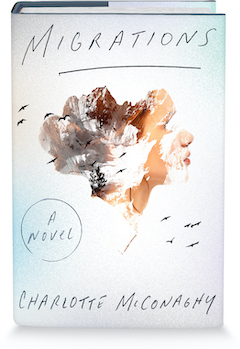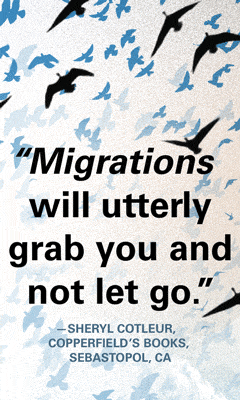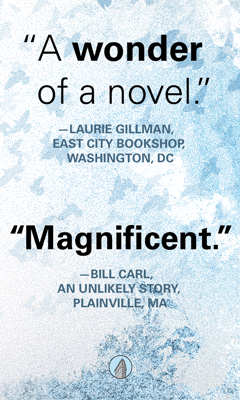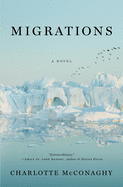Migrations
by Charlotte McConaghy
"The animals are dying. Soon we will be alone here."
In a near future in which climate change has caused a catastrophic number of animal extinctions, Franny Stone, a woman haunted by her own stormy past and wandering soul, is determined to follow the last reported colony of Arctic terns in Charlotte McConaghy's beautifully haunting adult fiction debut, Migrations.
"I spent the first decade of my life in a wooden house so close to the sea I was able to tune my swift child's pulse to the shhh shhh of the neap and spring tides." Much like a modern-day selkie, Franny has always felt as one with the natural world around her, making friends with the crows and delighting in the frigid ocean water of the Irish coast. Unable to stay in one place, she could be found roaming the countryside; "she's got itchy feet and that's a tragedy," Franny's neighbors used to say to her mother.
Now a young woman, Franny Stone is still in motion, running from the tragedies in her past and toward her adopted purpose in life: to follow the migration of the Arctic tern, the bird with "the longest migration of any animal," to study the effect of climate change on their flight habits. She's in awe of "the beauty of delicate white wings that carry a creature so far. I think of the courage of this and I could cry with it." After successfully attaching trackers to three of the birds, Franny convinces the captain of a fishing vessel, Ennis Malone, to take her on board with his crew and follow the terns on their global trek from Greenland to Antarctica. In return, Franny guiltily promises Ennis an ever-elusive big fishing haul: the terns will follow the fish, and they will follow the terns. Though she finds Ennis's work--hunting wild creatures in a world teeming with mass extinctions--horrific, she needs a ship to accomplish this "impossible, foolish fantasy."
Immersed in her own single-minded determination, Franny focuses on the tasks of the ship and on writing to her absent husband, Niall, a biology professor in Ireland. "The pile of letters to send him grows fat with the weight of my thoughts. I try to come to terms with our relationship, with the mistakes I made and the twisting paths we chose to take." But her devotion to the birds never wavers as she watches the three blinking dots on her laptop that mark the terns on their dangerous journey. As both man and nature impede their path--a wary crew, violent ocean storms, the global recall of all commercial fishing vessels, police searches--Franny's mission continues to consume her. "A will is a powerful thing, and mine has been called terrible." As the perils continue, she and Ennis develop a deepening mutual respect, each harboring a desperation to fix the broken lives they have left behind. The work becomes so centrally a part of her that Franny's purpose and will to live have become one and the same, and together she and Ennis fight to complete her pilgrimage, sailing to the ends of the world on little more than faith, desperation and a sense of finality: "One way or another, when I reach Antarctica and my migration is finished, I have decided to die."
Spanning oceans and decades, Franny's physical and emotional journeys are at times devastating and, at others, surprisingly, undeniably hopeful. Through flashbacks to Franny's childhood in Ireland, her intense romance and sudden elopement with Niall, the search for her mother (missing since childhood) and her bleak years in prison for a crime she does not remember, McConaghy carefully peels back the layers of her life and then meticulously weaves them together again, giving greater context and intensity to Franny's current pilgrimage to the Antarctic Circle. As Franny searches simultaneously for "a place to belong" and "whatever cruel thing drove me to leave people and places and everything, always," her unreliable narrative begins to reveal the truth behind her desperate search for redemption as raw emotion and memory leak through.
Australian novelist McConaghy paints a feverish, evocative picture of our crumbling world balance. Incorporating science and conservancy research, McConaghy doesn't oversimplify the crisis and, despite its vastness, it never overpowers Franny's own development. Even the obvious judgment of humanity's guilt in the extinction crisis--"[species] are being violently and indiscriminately slaughtered by our indifference"--receives nuanced revelation as conservationist Franny discovers an unlikely connection with fisherman Ennis.
Despite the dark nature of the story, McConaghy's novel manages to capture moments of lightness that keep hope and wonder in beauty alive for both her characters and readers. Brimming with stunning imagery and raw emotion, Migrations is the incredible story of personal redemption, self-forgiveness and hope for the future in the face of a world on the brink of collapse. --Jennifer Oleinik








